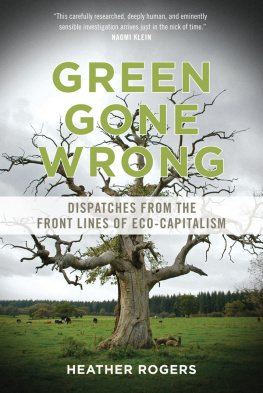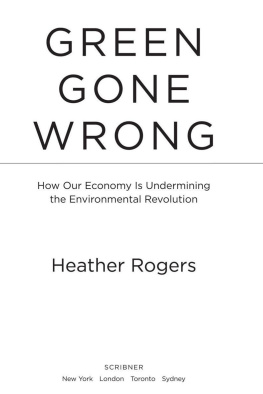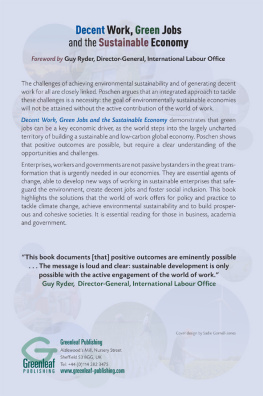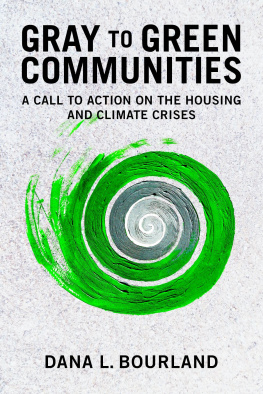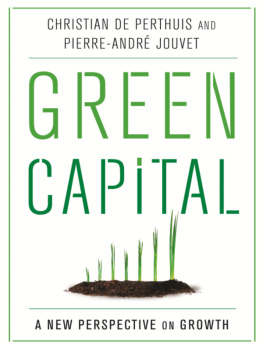
GREEN
GONE
WRONG
Dispatches from the Front Lines of Eco-Capitalism
Heather Rogers

To my family
Contents
T he riots started in early 2007. The first country to erupt was Mexico. In just one year the price of corn, the key ingredient in tortillas, had shot up more than 80 percent. Suddenly, not just the poorest but also wage earners were unable to put food on the table. Tens of thousands of workers and peasants angrily took to the streets, marching down Mexico Citys main thoroughfare to the famous Zcalo, setting off what came to be called the tortilla riots. To quell the uproar, Mexican president Felipe Caldern was forced to announce a price freeze on corn. In the ensuing months the world convulsed with violent unrest in over thirty countries, including Egypt, Somalia, Colombia, Indonesia, Thailand, Vietnam, Cameroon, and Haiti. The sometimes deadly protests were set in motion by a global food crisis triggered in part by the diversion of food crops to refineries making plant-based transportation fuels known as biofuels. Considered ecologically sustainable, biofuels can substitute for fossil fuels, thereby cutting emissions of carbon dioxide, a major contributor to global warming. However, todays eco-friendly fuel is made from edible crops such as corn, soybeans, sugarcane, and palm oil (a vegetable oil); thanks to subsidies and the high price of oil, at that time selling crops for biofuels offered a bigger return than selling them for food, so growers and agribusiness followed the money.
By the spring of 2008 food prices peaked further still, having surged by more than 50 percent from the year before. Discontent ignited across the globe as grocery bills went through the roof. The cost of vegetable oils, wheat, rice, and other basics soared well beyond reach in developing countries, where many people spend half or more of their income to keep their families fed. As strife over rising prices intensified, more than forty people were killed in Cameroon. In Haiti, the prime minister was ousted and at least four rioters were shot and killed amid street protests over the scarcity and escalating costs of food. In China, a stampede at a supermarket that had discounted its prices left three shoppers dead and another thirty-one injured. Small vendors in outdoor markets in Indonesia sold vegetable oil that appeared new but was used; the dark color from cooking was eliminated by adding household bleach, which buyers would unwittingly ingest.
As the terrible social impacts of crop-based biofuels grew more acute, questions also began arising about their supposed environmental benefits. People such as David Pimentel, professor of ecology and agriculture at Cornell University, claimed it required more energy to grow and refine corn ethanol than the alt-fuel could provide. According to assessments such as Pimentels, corn ethanol was a net loser when it came to preventing carbon dioxide emissions. In other arenas environmental groups such as the Rainforest Action Network and Friends of the Earth were already campaigning against the supposedly eco-friendly fuels. These organizations said escalating demand for biofuels was driving deforestation as agribusiness expanded into tropical-forest zones. Detailing these knock-on effects, two reports published in early 2008 in the journal Science stated that more carbon dioxide was being released into the atmosphere from the production of some biofuels than if people continued filling their tanks with gasoline and diesel.
That same year deforestation rates in Brazil shot up sharply. Similarly, Indonesia had recently earned the dubious distinction of becoming the worlds third-largest carbon dioxide emitter, trailing only China and the United States. Much of Indonesias spike in CO2 came from clear-cutting and burning trees to make room for crops that could be refined into biofuels. Imagine millions of acres of dense rain forest teeming with the worlds most diverse flora and fauna. A crew armed with chain saws and bulldozers forges a narrow path through the trees. The workers begin to rip away and flatten the forest as wildlife, including endangered species such as orangutans, flee for their lives. A bulldozer shoves innumerable splintered trees into tangled piles that stretch for miles, and crews set them alight. Ferocious fires blast through what was once a dynamic web of life, leaving behind a carbon dioxidefilled haze and a silent, charred wasteland. After the forest has been erased its almost impossible to imagine what was once there.
Such outcomesviolent social upheaval, and the further shattering of vital ecosystemsreveal some of the dangers of taking up solutions without serious critical assessment. So how do we work toward solving the profound ecological problems we face in ways that dont make matters worse?
MORE IS LESS
From todays vantage point, 2006 was a big year. Thats when global warming was finally acknowledged by the last, and very powerful, holdouts: U.S. government and industry. The city of New Orleans still lay smashed from the previous years Hurricane Katrinaa storm that was likely intensified by the effects of global warming. Commissioned by the British government, the Stern Review was published, the foremost study on the grim economic impacts and financial risks of climate change. Also in 2006, Al Gores documentary film, An Inconvenient Truth, helped convince the mainstream that global warming was real and the result of human activity. These events were backed up by reports from the Intergovernmental Panel on Climate Changea global body of scientists and governments created in 1988 under the auspices of the United Nations to assess the latest atmospheric sciencethat confirmed industrialized society plays a significant role in creating global warming.
Newfound acceptance of the dangers of unchecked greenhouse gas emissions set off a barrage of coverage in magazines and newspapers, on talk shows and websites. Major rock groups such as the Rolling Stones, KT Tunstall, and the Dave Matthews Band started planting trees to cancel out the CO2 released from their tours and the production of their albums. Hillary Clinton, Leonardo DiCaprio, and the pop entrepreneur Richard Branson began proselytizing about the need to take action. Even George W. Bush, the notorious global warming denier, uttered the words climate change in his 2007 State of the Union address.
As of 2007 global warming had become a fact of life, and growing numbers of people were looking for solutions. A news broadcast from that year, a midday edition of CNN International, typified the emerging state of affairs. The lead story featured an intrepid but well-coiffed reporter exploring catastrophic ice loss at the north pole. Visually incongruous with the blank, undulating landscape, the perky newswoman explained that temperatures were climbing faster in arctic regions than elsewhere on the planet, and at a more rapid clip than previously thought. The latest projections, she reported, said summer ice may be extinct as soon as 2040, taking several animal species with it. The follow-up segment on CNN that day was what Wal-Martthe biggest retailer on the planetwas doing to address ecological degradation. In addition to reducing energy consumption in its stores and using more fuel-efficient trucks, the company committed to push its 180 million customers to buy more commodities it deemed helpful to the environment. As this example suggests, the dire and depressing problem of climate crisis is increasingly being answered by the next phase of environmentalism: the buying and selling of ecologically responsible products.
Next page
